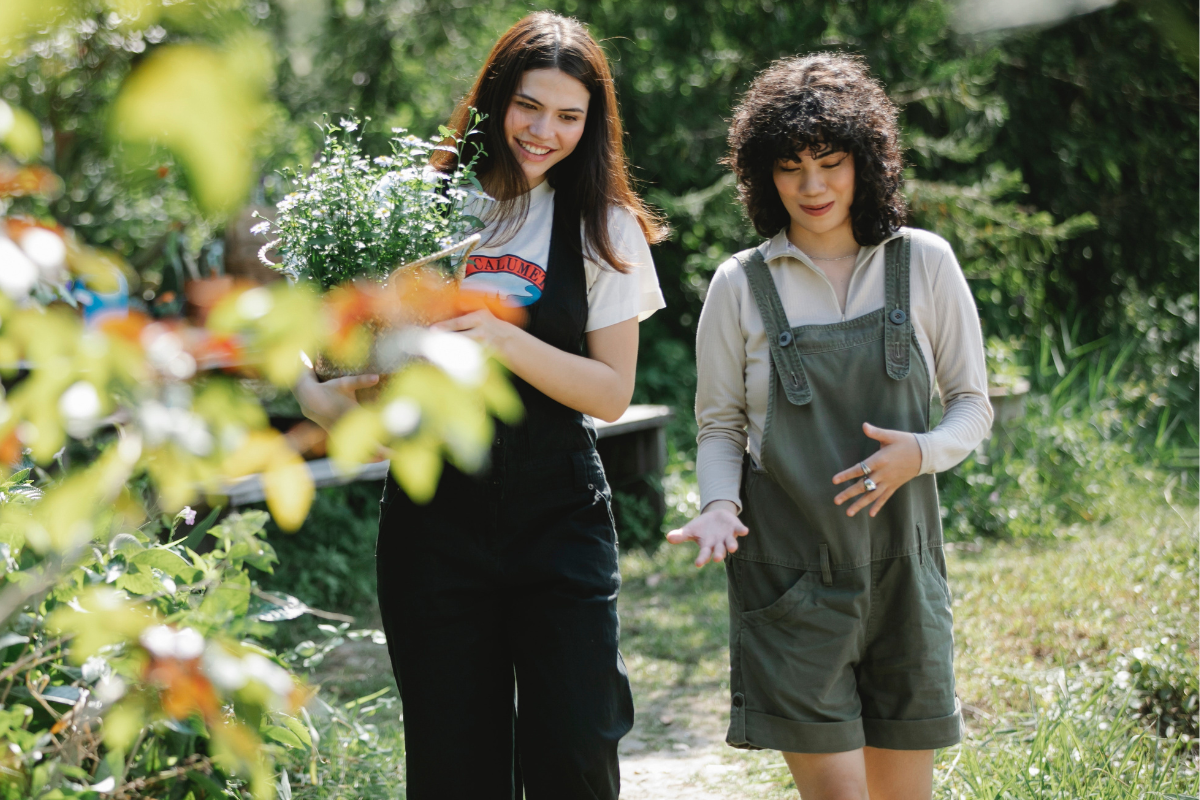It’s easy – and totally human – to get caught up in the thrills of a relationship, particularly in the passion and excitement of the ‘honeymoon stage’. Your partner can become your priority, and you wouldn’t be the first newly-in-love couple to want to spend every free second together. There’s absolutely nothing wrong with this, just as long as we aren’t doing it at the expense of other important relationships in our life – including our precious friendships.
Friends play a critical role in supporting and shaping who we are at all stages of our lives – but it can get kind of hard maintaining them as we grow older and our schedules, relationships and priorities shift.
Having tunnel vision for your partner can lead you to neglect your friendships, and might even mean you begin to develop unhealthy patterns and behaviour, like codependency.
Here, we outline the importance and benefits of healthy friendships. Spoiler – having good friends may actually improve your romantic relationship. We’ll also share tips to help you nurture these important connections and avoid relying on your partner to meet all your needs.
Benefits of friendships
Friendships have long been linked with psychological wellbeing – they can have a major positive impact on your health and enrich your life in so many ways.
Social connections are vital to living a long, happy and healthy life, and studies consistently show how friendships benefit our mental and physical health. Research from the American Psychological Association reveals people who have friends and confidantes are more satisfied with their lives and less likely to suffer from depression.
The flip side is no different. According to professor of psychology and neuroscience at Brigham Young University Julianne Holt-Lunstad’s meta-analysis of more than 308,000 people, those with no friends or poor friendships are twice as likely to die prematurely – a risk factor that’s even greater than smoking 20 cigarettes a day!
The joys of romantic relationships often steal the limelight in our culture, but friendships have been proven to be just as fulfilling – albeit in a different way. With friends, it can sometimes feel easier to be more authentic and at ease, which can often be more relaxing than being with your partner – especially in the early days of an intimate relationship when you’re still finding your feet.
Friendships tend to be much less emotionally demanding than intimate relationships – providing the perfect antidote to the intensity or mundanity of a long-term relationship.
Strong, positive friendships can even offer a lot of the same benefits as secure romantic relationships, including:
- emotional support and improved mental health
- strong sense of belonging and connection
- a positive sense of self
- companionship
- an increase in happiness, serotonin and oxytocin.
Your partner isn’t your therapist
When we’re in an intimate relationship, we can wear many different hats – the partner, the best friend and sometimes even the therapist. Relying on our partners for some of our needs can foster trust and connection, but we should be mindful of expecting too much from the other person.
If we’ve had unstable or difficult childhoods, or have been hurt in previous romantic relationships, we might lean heavily on our partners emotionally. We may unwittingly unload traumatic experiences from the past onto our significant other, without warning or invitation.
In a healthy, trusting relationship, we can and should expect emotional security. But asking your partner to carry the load – or even help you process and work through these struggles – could be unfair and unrealistic.
Everyone has their own needs and boundaries, including you. Being wary of when you might be crossing the line will help alleviate unrealistic expectations or miscommunications. It’s always best to sort through bigger and more complex issues with a trained professional, like a counsellor or psychologist, instead of overburdening your relationship.
One person can’t give you everything you need
As psychotherapist Esther Perel says, expecting your partner to fulfil all of your emotional needs – affection, trust and intimacy – is a very contemporary (and fairly unrealistic) concept.
“You’re asking one person to give you what an entire village used to provide,” she says.
Even the strongest relationships need space every now and then. That’s why friendships and other relationships, including with our family and colleagues, are necessary. It’s refreshing to hear or experience new perspectives to widen our understanding of the world and ourselves.
Spending too much time in our romantic relationships can even result in codependency, a term used by counsellors to describe imbalanced relationships, where one person enables another’s unhealthy or even self-destructive tendencies.
Living in the present moment is valuable, but being aware of the love bubble you’re occupying – and being realistic about the future might hold – can be important early on in your relationship.
If you and your partner were to break up, and you’d limited your world so it only encompassed the one you shared as a couple, you could find yourself without a strong support network – something you really need when times are hard.
Healthy friendships and romantic relationships
Friendships provide health and emotional benefits whether you’re coupled up or not – but friends can even help improve your romantic relationship. Having friends you can rely on and trust provides much-needed support and an outlet for stress, which can make you a better partner overall.
Close friendships can benefit your romantic relationship in many ways.
- Friends offer different and more objective perspectives on you and your relationship.
- Good friends provide constructive feedback that helps you evolve and improve yourself.
- Spending time with people who know and love you can help you understand yourself better, in a way that’s different from your partner.
- When you have close friends you can confide in, they can provide advice and support tailored to you.
- Every relationship will have its tough times – that’s when it’s important to have an outlet where you can vent without fear of judgement or criticism.
- When you need space from your partner or simply want to relax, friends know how best to comfort you.
Ways to nurture our friendships
It’s not always easy to develop or maintain friendships, particularly as we grow older and our lives take different paths and new and unexpected challenges arise. Keeping these points top of mind can help.
Friendships are reciprocal
The effort and feelings between you should – on the whole – be mutual. Experts recommend simply making an effort to keep friends a part of your schedule. Without consistent communication or catch-ups, it’s difficult to preserve an ongoing connection.
It’s the quality, not the quantity
Research has repeatedly found that it’s best to prioritise quality over quantity when it comes to confidantes. You may have heard of Dunbar’s number, discovered by Oxford psychologist Robin Dunbar, which found that people can handle around 150 friendships – but your most intimate circle usually consists of just five.
Technology can be a tool for friendship
While technology is often blamed for creating some less-social habits, if we use it right, it can play a major part in how we nurture, or even make, friends.
Online communication can provide a sense of connection and help continue to build a friendship when physical contact isn’t possible. Don’t discount its power in building community and a sense of belonging.
Friendships should fill your cup
Most importantly, friendships should make you feel good – and vice versa. While Dunbar landed on five as the common number for close friends, he also argues these five continue to change as we do. It’s completely normal to outgrow or let go of friendships that leave you feeling drained or unhappy.






